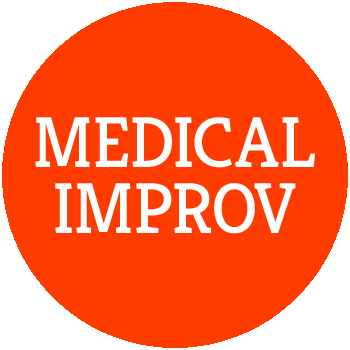What is Medical Improv?
Medical Improv is an emerging field in which the principles and training techniques of improvisational theater are used to improve cognition, communication, and teamwork in the field of medicine.
Medicine, like theater, is both an art form and a skill set. The practice of medicine demands exceptional communicative, cognitive, and interpersonal skills in order to improvise appropriate responses to unpredictable situations while interacting with a wide variety of individuals. Unfortunately, documented shortcomings in medical errors, teamwork, information transfer, and patient satisfaction indicate that there is significant room for improvement in communication skill training for clinicians.
Improvisational theater skills have a surprising and substantial overlap with skills required of clinicians. Improv is a genre of performance art grounded in principles of spontaneity, adaptability, collaboration, and skilled listening. Improv actors develop these skills by participating in specialized training methods that have been refined over the last century. “Improv” is not synonymous with “comedy,” but the fundamental principles of improv (spontaneity and honesty) can naturally lead to humor. That’s what makes medical improv “serious play”—the method is fun, but the goals are serious.
What turns “improv” into “medical improv” is the careful selection and adaptation of improvisational theater principles and exercises to match medical goals and skills, followed by targeted discussion that ties improv to the medical environment. Improv is performed by actors on stage for the purpose of entertainment; medical improv is performed by clinicians in the workplace for the purpose of patient care.
Improvisational theater’s successful training structure could contribute to filling a current curricular deficit in clinician communication skills education. As the field of medical improv develops, its curricula and methods will evolve to address the unique educational needs of individuals in the field of medicine.
About us
Katie Watson, JD is an Associate Professor at Feinberg School of Medicine, Northwestern University, where she is an award-winning teacher of medical humanities, bioethics, and constitutional law. In 2002 Professor Watson integrated her expertise in medicine and improv to create a 10-hour improv course for Feinberg medical students, which she’s been teaching as a selective ever since. (She began studying and performing improv in 1997, and she was faculty at Chicago’s Second City Training Center 2008-15.) In 2011 Professor Watson originated the term “medical improv” in her Academic Medicine article about her work, and in 2013 she taught the nation’s first Medical Improv Train-the-Trainer Workshop. Her novel communications curriculum is now taught in medical schools and other health care training settings across the country, it was featured in the AAMC’s 2020 publication “The Fundamental Role of the Arts and Humanities in Medical Education,” and Professor Watson has presented keynote lectures, grand rounds, and workshops on medical improv for trainees and clinicians at medical schools, hospitals, and conferences across the country.
Contact: k-watson@northwestern.edu | More info: Faculty Profile
Belinda Fu, MD is a family physician, medical educator, and performing artist. She is Clinical Associate Professor of Family Medicine at the University of Washington (UW), and Founder/Director of The Mayutica Institute, an educational training organization. She attended Stanford (BA Human Biology), UC San Francisco for medical school, and UW for residency. Belinda has been an educator since 1998, teaching undergrads, medical students, residents, faculty, and clinicians at Stanford, UW, and institutions across the country. She is recognized for her engaging keynotes, lectures, and workshops, and for her expertise in faculty development, communication skills, physician wellbeing, and medical improvisation.
Since 2012, Belinda has built foundations for the field of medical improv. Collaborating with Prof. Katie Watson, Belinda co-organized the first Medical Improv Train-the-Trainer Workshops and co-authored the definition of “Medical Improv” in their 2015 article of the same name. Belinda has taught medical improv to healthcare professionals around the world, published the “Attune-Affirm-Advance” model of medical improv skill development, and helped establish the Medical Improv Collaborative, a professional community of academic med improv practitioners.
Belinda is active in the theater community, performing, directing, and teaching with multiple ensembles in the Pacific Northwest. She also enjoys a good book and a cup of tea.
Contact: belinda@improvdoc.org | Web: belindafu.com


